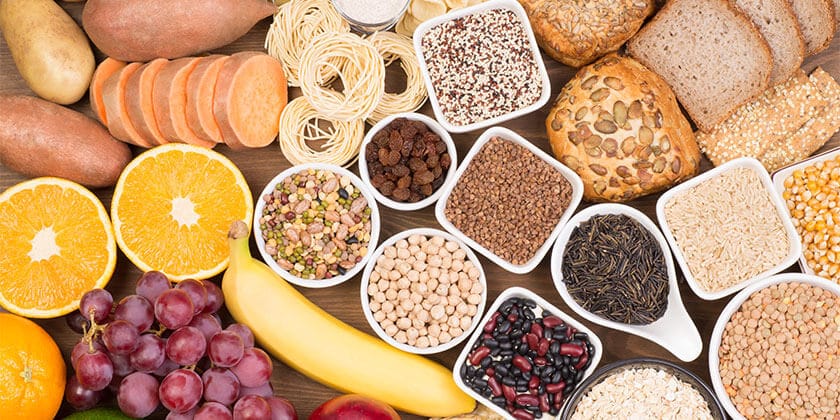Fuel for thought

Some celebrities won’t eat them after 7 pm, marathon runners swear by them and Instagram Fitspo stars cause confusion when providing their take on them. Whether you crave them or avoid them, the carbohydrate is often at the centre of the diet debate. Sports Dietitian, Claire Ward, provides some commonsense answers to your carbohydrate concerns.
We hear so much about low carb or even no carb diets – do we actually need to eat carbs at all?
Carbohydrates are found in so many common foods it’s pretty difficult to avoid them, but yes, you do need to eat them especially if you’re a runner. Carbohydrates are the body’s favourite source of fuel because they easily break down into glucose and are then stored in the muscles and liver as glycogen. If you don’t have adequate glycogen or fuel in your muscles, you’ll struggle to finish your run.
Glucose is also your brain’s favourite food so if you don’t eat carbs, you’ll struggle to concentrate and feel very fatigued.
What are the best sources of food for carbs?
Some sources of carbohydrate contain more nutrition than others. To get the best value from your plate aim to include fruit, milk, yoghurt, grains, pulses and starchy vegetables such as potato and pumpkin in your diet and look to avoid less nutritious sources such as cakes, biscuits, lollies and soft drinks.
Apart from fueling my muscles and brain, are there any other reasons I should eat carbs?
Definitely – carbs are the main source of fibre which is essential for a healthy bowel. Skimp on fibre can lead to a sluggish bowel and increase your risk of conditions such as diverticular disease and hemorrhoids.
Fibre is also great for weight management as it helps you feel full for longer. Good sources include fruit and vegetables (leave the skins on), pulses, nuts, seeds, and wholegrain foods.
We often hear carbohydrate-containing foods classified as high GI or low GI. What does that mean and which is best for runners?
The Glycemic Index (GI) classifies carbohydrate-containing foods based on the rate of digestion and absorption in the blood. The quicker your blood sugar rises after eating the food, the higher GI it is.
Generally, dietitians advise eating low GI foods. However, high GI foods can be useful for runners if they need a quick energy boost. Low GI foods include dairy, wholegrain cereals, soy products, fruit, milk, porridge, lentils, pastas and sweet potatoes. High GI foods include white bread, rice bubbles, short-grain rice, white potatoes, lollies, sports drinks and gels.
Should I aim for a carbohydrate-based breakfast on race day?
It’s best to eat something carbohydrate-based, low fat and easily digested such as toast or muesli before a race. Make sure you have plenty of fluids as well. However, don’t eat something you’re not used to or you’ll end up with stitch or an upset stomach. If you can only tolerate a banana, then for a 10K race you’ll be fine.
Are carbs best for refueling after a race or training run?
You need carbs and protein after a workout – the protein (eggs, meat or nuts) will help you repair your body and the carbs will help you refuel. A sandwich is ideal.
How much of my diet should be carbs?
Your daily intake can range from 20–60 per cent of your total depending on your exercise levels but the general population should aim for around 30–40 per cent.
That would mean half a cup of muesli with yoghurt for breakfast, fruit for a mid-morning snack and a protein and salad or a wholegrain sandwich for lunch. Mid-afternoon, have a small handful of almonds and then for diner a portion of protein, vegetables or salad and carbs in the form of potato with the skin on, pasta or rice.
What is carbo-loading and do I need to worry about it for the Real Insurance Sydney Harbour 10k & 5k?
Carbo-loading is when athletes build up their glycogen stores before a race – usually two to three days before an event. It’s generally only recommended for endurance races such as marathons or an ironman.
For a 10k or 5k race keep your diet consistent but bear in mind that eating carbohydrate-rich snacks or meals before training or an event will help maintain blood glucose levels and top up muscle glycogen stores which will help both physical and mental performance.
Real Insurance is proud to sponsor the Sydney Harbour 10k and 5k race, to take part in this spectacular event register now.
24 Jun 2019